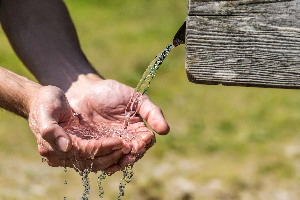4 Common Questions About High Iron Levels in Groundwater
Over 40 million Americans use groundwater for their household water needs. Having your own water supply is a cost effective and self-sufficient way to provide your home with this basic need, and installing a water well is one of the most popular ways to achieve this sustainability.

Unfortunately, around a quarter of all groundwater wells contain at least one contaminant that may leave your water supply unsafe for your family’s use. It’s vital to have the water quality tested regularly to ensure that it’s clean and safe. Depending on the results, you may need to install filtering or sanitizing products to purify and detoxify your water supply.
For example, some contaminants in groundwater come from septic tanks and agricultural chemicals. Other contaminants are from natural, geological sources and are harmless in small amounts. However, these natural contaminants can be very damaging to human health if your water supply has a high concentration level.
Iron is one such natural contaminant that can cause negative side effects if consumed in too-high quantities. Here are the answers to four commonly asked questions relating to iron in your groundwater supply.
- I Thought Iron Was Good for Me, Why Do I Need to Worry?
Iron is a vital element for human health. Iron deficiency is a serious health concern for many people. Drinking water that contains iron can help you to maintain healthy levels in your body. However, too much iron can also be a problem.
Drinking groundwater with excessively high levels of iron can cause serious and potentially deadly health problems. Toxic levels of iron have been known to cause gastrointestinal problems, heart disease, liver problems, and in rare cases, death. Excess iron levels have also been linked to a higher risk of developing Alzheimer’s disease.
- How Much Iron Is Too Much?
Having a small amount of iron in your water is beneficial to your health because it can help to supplement your overall intake and keep your iron levels at an optimal level. However, iron is found in many foods and can also be absorbed through the air, particularly in urban areas. Most people need only low amounts of iron via their water supply to maintain the right levels.
Iron needs vary from person to person depending on size, age, gender, and genetics. These factors mean that higher levels of iron might be safe and healthy for one family member but toxic for another. In the US, there are no laws to govern a safe level of iron in your drinking water. To err on the side of caution, you should only consume a level of under two milligrams per liter, as recommended by the World Health Organization.
- What Other Problems Can Excess Iron Cause?
As well as causing health problems, high levels of iron in your groundwater supply can cause other problems for your home. The water may taste dirty or rusty and your laundry may develop permanent staining. Too much iron in your groundwater can also cause discoloration of your pipes, bathtubs, toilets, and sinks.
High iron levels can also lead bacteria growth. This particular kind of bacteria thrives in high-iron environments and can build up in storage tanks, pipes, and water pumps. The buildup can cause blockages and a slimy coating that damages your plumbing system and, as mentioned above and as suggested by the Environmental Protection Agency, creates adverse health issues for your family.
- What Can I Do to Keep Iron at a Healthy Level?
The easiest way to maintain a healthy concentration of iron in your water supply is to install a specialized iron filter. These filters extract excess iron from the water through a process which utilizes a compressed air bubble. As your groundwater passes through the compressed air, the iron particles are removed and then flushed out.
Iron filters also remove sulfur from your groundwater supply. While sulfur is not considered a highly toxic contaminant, high concentrations can cause diarrhea. High levels of sulfur can also cause your water to smell like rotten eggs and have an unpalatable taste.
The first step to ensure that your groundwater supply has a safe and healthy level of iron is to have it tested. If the levels of iron are higher than two milligrams per liter, then the next step is having an iron filter installed in your groundwater system.
Johnson Water Conditioning has extensive experience in supplying and installing iron filters. We can provide an iron filter that is the right size and capacity for your groundwater usage system.
Contact our friendly team to discuss which model of iron filter will be the best choice for your home and your budget. We can also advise you whether any other water purification products, such as a chlorine injection system, may improve your water quality even further.

 Better Water for
a Better Life
Better Water for
a Better Life
